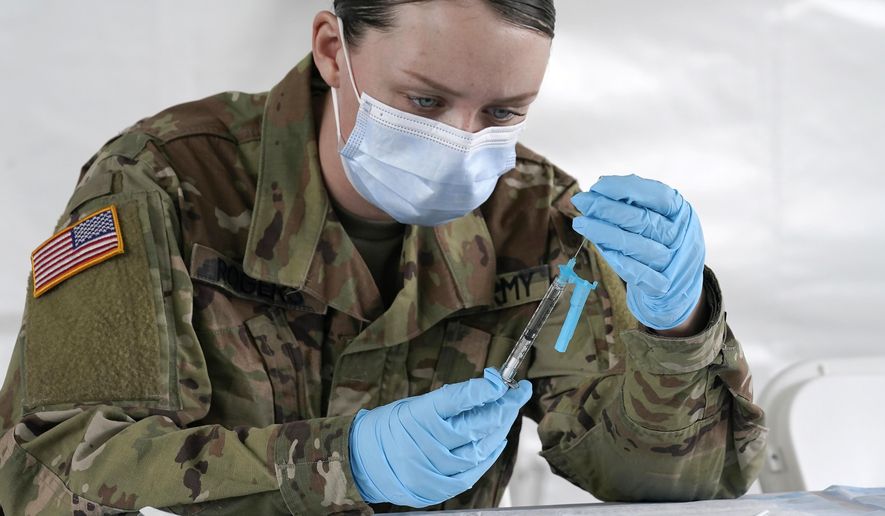The Pentagon reached a tipping point Wednesday as the deadline for soldiers in the U.S. Army, the largest military service, passed to get the COVID-19 vaccination. Troops who refuse the mandatory shots or aren’t in the process of receiving an accepted exemption will find themselves in an administrative limbo until they’re out of the military.
The Army’s Dec. 15 deadline was the last of the military services. Air Force personnel had until Nov. 2 to get the vaccine while the deadline for the Navy and Marine Corps was Nov. 28. Although no mass dismissals have occurred, a taste of what may be in store came this week when the Air Force said 27 members of the services had been kicked out for failing to get vaccinated.
Secretary of Defense Lloyd Austin ordered the mass vaccination effort, but put the onus of implementing it — and determining any possible punishments for resisters — on the services themselves.
Pentagon officials said the plan has been a success. Almost 90% of the total force — active duty as well as part-time reservists — has received at least one dose of the COVID-19 vaccine, while just under 75% can be considered fully vaccinated, numbers which compare favorably with the rates for the U.S. population as a whole.
“The vast majority are doing the right thing and did the right thing even before the vaccine was mandatory,” chief Pentagon spokesman John Kirby told reporters on Tuesday.
For months, top military leaders have alternated between pleading, cajoling and threatening the force to get the shots. With thousands of service members still unvaccinated amid record numbers of appeals for a medical or religious exemption to the new vaccines, the services have put away the carrot and pulled out the stick.
The Air Force said its personnel had until Nov. 2 to get the vaccine. On Monday, they confirmed that 27 personnel had been discharged for refusing the order. They are believed to be the first service members to be discharged under the new policy.
According to the Associated Press, none sought an exemption — either medical, administrative, or religious.
“Service members separated due to refusal of the COVID-19 vaccine will not be eligible for involuntary separation pay and will be subject to recoupment of any unearned special or incentive pay,” Air Force officials said in their COVID-19 policy.
Secretary of the Army Christine E. Wormuth said any soldier who refused the mandatory vaccination order won’t be allowed to reenlist, attend training courses, or be promoted — a process known as being “flagged.”
“The soldier will remain flagged until they are fully vaccinated, receive an approved medical or administrative exemption or are separated from the Army,” she wrote in a memorandum laying out the service’s COVID-19 policy.
Seeking to provide perspective, Mr. Kirby noted that the Air Force administratively discharged more than 1,800 personnel in 2021 over issues not related to the coronavirus pandemic.
“Administrative discharges are a common practice,” he said.
According to the latest Defense Department figures, more than 561,000 soldiers — both active and reserve — are fully vaccinated. Soldiers who refuse the mandatory vaccination order will be hit with a memorandum of reprimand unless they’ve been granted an exemption.
The decision to order mandatory COVID-19 booster shots is still under “active discussion” within the Defense Department but Secretary Austin is encouraging anyone who is eligible to receive it, Mr. Kirby said.
“The science does show that it absolutely helps reduce the risk of contracting,” COVID-19, he said.
The Pentagon is getting some powerful pushback from Capitol Hill. Sen. James Inhofe of Oklahoma, the powerful senior Republican on the Senate Armed Services Committee, called the mandate “haphazardly implemented and politically motivated” in a blistering Oct. 18 letter to Secretary Austin.
“Combined with the uncertainty and burden the vaccination mandate places on industry, this administration will do more damage to the nation’s security than any external threat,” Mr. Inhofe wrote. “The lack of strategic foresight in the implementation of the COVID vaccination mandate is inexcusable.”
Defense Department officials have long asserted that the vaccine is critical to maintaining the health of the armed forces and its ability to respond to any national security threats.
Sen. Roger Marshall, Kansas Republican, said he supports the COVID-19 vaccine but also supports those who have “carefully weighed” their decision on whether to receive the shots.
“These servicemen and women do not deserve a dishonorable discharge for choosing against the vaccine — a dishonorable discharge treats our heroes as felons and our American heroes deserve better,” he said in a statement.
Sen. Marshall, a former Army doctor, said the final text of the upcoming Pentagon budget contains a provision that would provide “retroactive protection” if they receive an other than honorable discharge for refusing to take the COVID-19 vaccination.
State officials also jumped into the debate over the vaccine mandate for military personnel. Oklahoma’s Republican governor and the state’s attorney general filed a federal lawsuit challenging the mandate for the state’s national guard troops. Gov. Kevin Stitt said Secretary Austin is overstepping his authority with the order to the state forces.
That dispute will have to be answered in the courts or by Congress, Brig. Gen. Thomas H. Mancino, Oklahoma’s adjutant general, said in a message to the troops.
“Anyone exercising their personal responsibility and deciding not to take the vaccine must realize that the potential for career-ending federal action, barring a favorable court ruling, legislative intervention, or a change in policy, is present,” Gen. Mancino wrote.
Oklahoma’s top general said he is fully vaccinated and believes it is perfectly safe against COVID-19 based on the millions of doses that have been administered.
“I also recognize each soldier and airmen’s right to choose for themselves. This is a right you have irrespective of the actions of the governor or myself on your behalf,” Gen. Mancino wrote.
For more information, visit The Washington Times COVID-19 resource page.
• Mike Glenn can be reached at mglenn@washingtontimes.com.




Please read our comment policy before commenting.